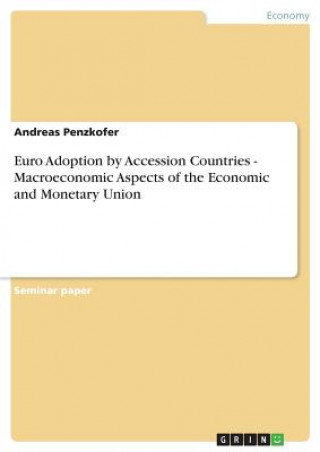
Kód: 01593968
Euro Adoption by Accession Countries - Macroeconomic Aspects of the Economic and Monetary Union
Autor Andreas Penzkofer
Seminar paper from the year 2006 in the subject Economics - Macro-economics, general, printed single-sided, grade: 1,0, Wayne State University (Department of Economics), course: Macroeconomics, 26 entries in the bibliography, lang ... celý popis
- Jazyk:
 Angličtina
Angličtina - Väzba: Brožovaná
- Počet strán: 36
Nakladateľ: Grin Publishing, 2008
- Viac informácií o knihe

Mohlo by sa vám tiež páčiť
-

Making the European Monetary Union
35.84 € -

Knowledge-Based Intelligent Information and Engineering Systems, 2 Teile. Pt.1
121.67 € -

No Time for Fig-leaves
20.99 € -

Inner Ocean
54.48 € -

Zeitmanagement beim Lernen mit Loesungsbeispielen - Eine kleine Forschungsarbeit
49.67 € -

Faust
8.29 € -

Dackel
27.95 € -4 %
Darčekový poukaz: Radosť zaručená
- Darujte poukaz v ľubovoľnej hodnote, a my sa postaráme o zvyšok.
- Poukaz sa vzťahuje na všetky produkty v našej ponuke.
- Elektronický poukaz si vytlačíte z e-mailu a môžete ho ihneď darovať.
- Platnosť poukazu je 12 mesiacov od dátumu vystavenia.
Viac informácií o knihe Euro Adoption by Accession Countries - Macroeconomic Aspects of the Economic and Monetary Union
Nákupom získate 166 bodov
 Anotácia knihy
Anotácia knihy
Seminar paper from the year 2006 in the subject Economics - Macro-economics, general, printed single-sided, grade: 1,0, Wayne State University (Department of Economics), course: Macroeconomics, 26 entries in the bibliography, language: English, abstract: On 1st May 2004 ten new member states joined the European Union (EU), e.g. Estonia, Poland and Slovenia. The countries won t adopt the euro as their new currency immediately, because they first have to show that their economies have converged with the economy of the euro zone.Presently, the efforts and opinions of the new members differ about the adoption of the single currency. For instance, the Slovenian Prime Minister Janez Jansa told the press in February 2006 that there is nothing on the path ahead that could endanger the euro adoption in 2007. The government pursues a tight fiscal policy to meet all entry requirements. Recently, it introduced a dual pricing that means all prices of goods and services are marked in tolars as well as euros to raise consumer awareness in the preparation for the euro adoption.1 Contrarily, other countries are skeptical. The leader of the Polish conservative party Jaroslaw Kaczynski said during a campaign that he doesn t see any benefits in adopting the euro. Euro adoption would lead to lower exports, lower national income and higher unemployment. The Estonian Sirje Karu said in an interview, that Estonians are scared. We heard that when Finland adopted the euro, it took them quite a while to get used to it and prices increased. The poorest suffered. Using this situation as a background, it is interesting to analyze the euro adoption by accession states. How does the adoption process work? When should the euro be introduced and what macroeconomic effects does it have?
 Parametre knihy
Parametre knihy
Zaradenie knihy Knihy po anglicky Economics, finance, business & management Economics
67.18 €
- Celý názov: Euro Adoption by Accession Countries - Macroeconomic Aspects of the Economic and Monetary Union
- Autor: Andreas Penzkofer
- Jazyk:
 Angličtina
Angličtina - Väzba: Brožovaná
- Počet strán: 36
- EAN: 9783638681131
- ISBN: 3638681130
- ID: 01593968
- Nakladateľ: Grin Publishing
- Hmotnosť: 113 g
- Rozmery: 297 × 210 × 4 mm
- Dátum vydania: 30. April 2008
Obľúbené z iného súdka
-

Principles for Dealing with the Changing World Order
24.37 € -12 % -

Why Nations Fail
14.43 € -23 % -

Misbehaving - The Making of Behavioral Economics
10.64 € -11 % -

Start-Up Nation
9.11 € -24 % -

Business Model Navigator, The
26.72 € -14 % -

Fed Up
25.60 € -18 % -

Team Topologies
23.96 € -12 % -

Economics In One Lesson
15.76 € -23 % -

Art of Statistics
10.95 € -24 % -

Freakonomics
9.11 € -10 % -

Rational Optimist
13.72 € -

Essential Mathematics for Economic Analysis
73.12 € -1 % -

Liar's Poker
13.72 € -

Predictably Irrational
14.94 € -19 % -

Irrational Exuberance
20.48 € -8 % -

Price of Inequality
10.54 € -22 % -

The Invisible Hand
7.98 € -22 % -

How I Made One Million Dollars Last Year Trading Commodities
53.36 € -

(Mis)Behaviour of Markets
14.43 € -23 % -

Breakthrough Copywriter
17.81 € -

Economics 101
14.84 € -18 % -

Leading at a Higher Level
34.61 € -

Cartoon Introduction to Economics
19.76 € -8 % -

Human Action
38.09 € -

New World Economy: A Beginner's Guide
15.35 € -21 % -

Ludwig von Mises
22.93 € -

J R
27.65 € -5 % -

Radical Uncertainty - Decision-Making Beyond the Numbers
19.04 € -2 % -

Speak Up
18.73 € -13 % -

Pyramid Principle, The
51.31 € -

Economic Facts and Fallacies
16.99 € -20 % -

A-Level Economics: Year 1 & 2 Complete Revision & Practice (with Online Edition)
28.36 € -9 % -

Scrum - A Pocket Guide - 3rd edition
22.83 € -4 % -

Debt, 10th Anniversary Edition
28.06 € -22 % -

Freakonomics
6.44 € -25 % -

Misbehavior of Markets
24.68 € -

Econometric Analysis, Global Edition
86.54 € -

Hypomanic Edge
21.19 € -12 % -

ITIL4 A POCKET GUIDE
25.19 € -

Decision Book
16.17 € -16 % -

Principles of Economics
15.97 € -13 % -

45 Second Presentation That Will Change Your Life
10.03 € -19 % -

Economics of the Public Sector
83.37 € -

Discovery, Capitalism & Distributive Justice
22.93 € -

Economics: The User's Guide
12.90 € -24 % -

Think Like a Freak
9.72 € -25 % -

Phishing for Phools
16.38 € -14 % -

Rise of Carry: The Dangerous Consequences of Volatility Suppression and the New Financial Order of Decaying Growth and Recurring Crisis
27.75 € -16 % -

Cult of We
12.28 € -23 %
Osobný odber Bratislava a 2642 dalších
Copyright ©2008-24 najlacnejsie-knihy.sk Všetky práva vyhradenéSúkromieCookies



 21 miliónov titulov
21 miliónov titulov Vrátenie do mesiaca
Vrátenie do mesiaca 02/210 210 99 (8-15.30h)
02/210 210 99 (8-15.30h)